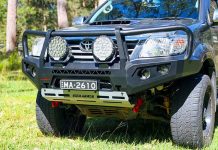Royal Flair is targeting budget-conscious caravan buyers with the return of its classic Micron.
With its rear-door entry, the new 16ft 6in Micron retails for about $76,000. It’s classified as an ‘entry level’ caravan, designed to attract a wider range of customers to the Royal Flair brand.
Nowadays, when I think Royal Flair, I think of big, substantial units designed for extended off-grid living, from the Eco-Mate to the new-look Razor XT. But once upon a time, Royal Flair had this little guy in its line-up, though it was built very differently and had a pop-top roof.
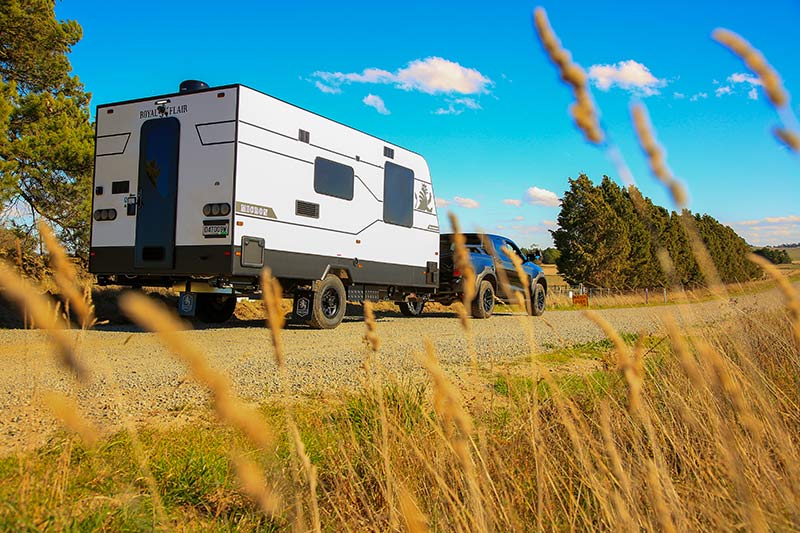 But materials and methods have changed since then. Gone is the stick and tin found on the early Royal Flair Micron. This van has just been relaunched with a modern aesthetic and a contemporary construction.
But materials and methods have changed since then. Gone is the stick and tin found on the early Royal Flair Micron. This van has just been relaunched with a modern aesthetic and a contemporary construction.
Being only 16ft 6in on a single axle, with a Tare just over 1800kg, it’s an intriguing proposition for people who don’t want, need or can’t afford a big, luxurious number. Given it’s relatively light weight, it’s also designed to appeal to customers who don’t have the means to tow particularly high weights.
OUTSIDE THE ROYAL FLAIR MICRON
While the Micron might be an ‘entry level’ caravan, it stills gets the full Royal Flair attention to detail. Visually, it’s a good-looking caravan designed primarily for holiday park stays rather than long trips into remote areas. Built atop a painted 4in SupaGal chassis with a 2in chassis raiser and a 4in drawbar, the body is built from fibreglass sandwich panels and a ‘honeycomb’ flooring system, materials that weren’t available when the Micron made its debut decades ago.
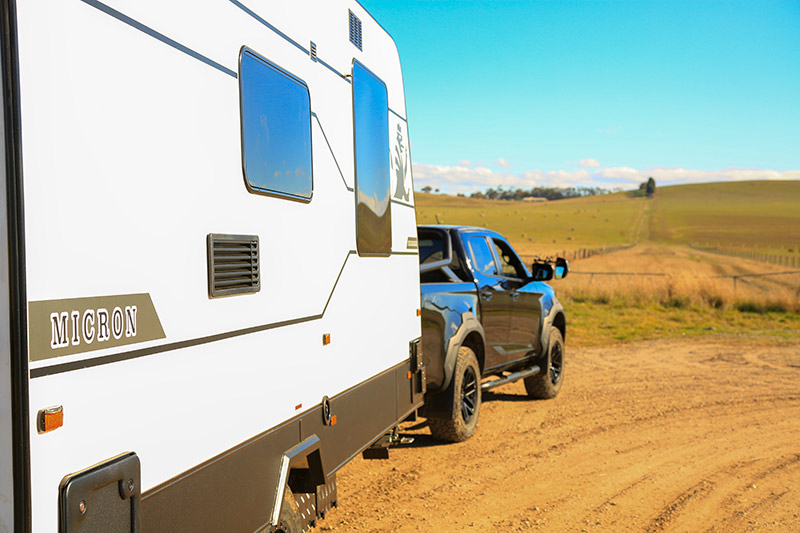 This year, Royal Flair introduced smooth, powder-coated Bluescope steel sheeting, using it as the preferred protective material over the cladding instead of black checkerplate.
This year, Royal Flair introduced smooth, powder-coated Bluescope steel sheeting, using it as the preferred protective material over the cladding instead of black checkerplate.
Our review Royal Flair Micron was a prototype, and there have been some minor changes to production vans. For example, the van we checked out had a fairly low skirting of this material, which is functionally the same as checkerplate – it just looks more contemporary. However, production vans have 600mm-high side plates and a 1000mm-high front plate.
The fibreglass sandwich panel construction is a big tick in this van’s favour, though. It not only looks good, it is also hail and dent-resistant, while the XPS closed-cell foam core offers excellent insulating properties as well as structural strength.
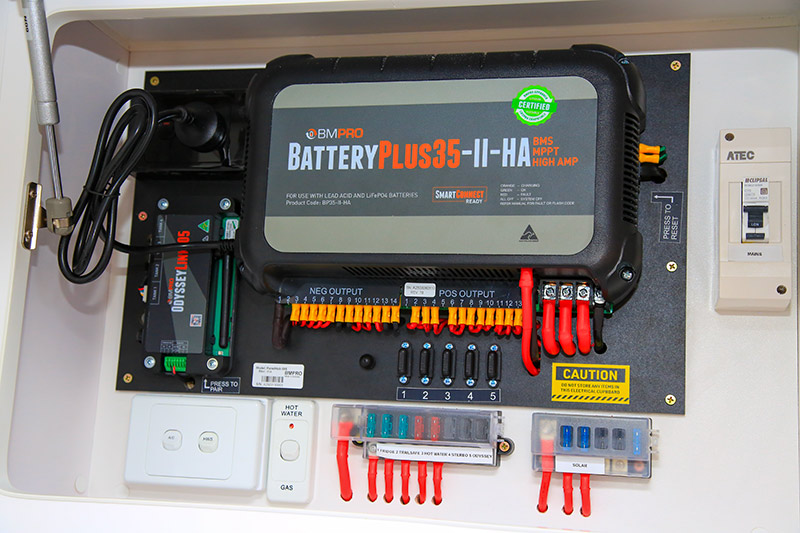 As standard, the Micron comes with a 100Ah lithium battery, a 200W solar panel on the roof, and a BMPRO BatteryPlus 35 power management system with Odyssey Link. The Odyssey Link sends crucial battery data to a digital display mounted in the bulkhead, just above the rear door, as well as to a smartphone app. The BatteryPlus 35, which has a 30A multi-stage AC charger, can support solar input of up to 800W through its inbuilt MPPT regular, so there’s plenty of scope to add additional solar panels down the track.
As standard, the Micron comes with a 100Ah lithium battery, a 200W solar panel on the roof, and a BMPRO BatteryPlus 35 power management system with Odyssey Link. The Odyssey Link sends crucial battery data to a digital display mounted in the bulkhead, just above the rear door, as well as to a smartphone app. The BatteryPlus 35, which has a 30A multi-stage AC charger, can support solar input of up to 800W through its inbuilt MPPT regular, so there’s plenty of scope to add additional solar panels down the track.
While the prototype Royal Flair Micron that we checked out was fitted with torsion bar suspension, production vans have leaf-spring suspension as standard. It’s fresh water supply comes from a single stoneguard-protected 95L water tank – the 12V water pump is fitted inside an external steel box mounted to a chassis rail, which will make things a little quieter inside when the pump is running!
It might be a little rig, but it is still quite nicely equipped with external features. There’s a nearside awning, a fold-down picnic table, attractive LED taillights, a roof-mounted VanTenna TV antenna to ensure you get the best possible terrestrial signal for the 24in smart TV that comes with the van, and a particularly spacious front tunnel boot.
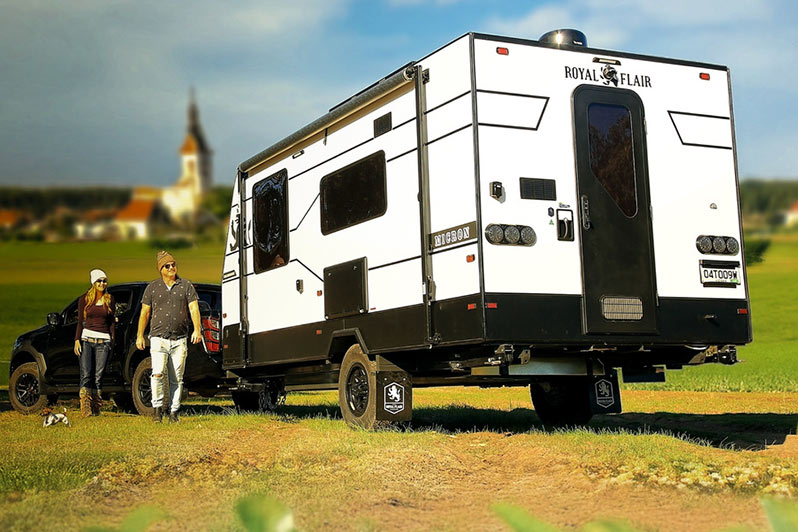 There isn’t a toolbox mounted to the A-frame, making room for Royal Flair to instead mount the spare wheel here. Given this van has the rear-door entry, a traditional rear bumper, where the spare wheel is often mounted, isn’t possible. The A-frame position is a good alternative – it adds to the van’s ball weight, sure, but ball weight is a necessary component of caravan stability, and as I towed the Royal Flair Micron, I really did find it to be a stable towing proposition. The unladen ball weight of our prototype van was 222kg.
There isn’t a toolbox mounted to the A-frame, making room for Royal Flair to instead mount the spare wheel here. Given this van has the rear-door entry, a traditional rear bumper, where the spare wheel is often mounted, isn’t possible. The A-frame position is a good alternative – it adds to the van’s ball weight, sure, but ball weight is a necessary component of caravan stability, and as I towed the Royal Flair Micron, I really did find it to be a stable towing proposition. The unladen ball weight of our prototype van was 222kg.
Another observation about the Micron when under tow: it almost turns on a dime. That was my experience with it hitched to my MU-X. The van was very manoeuvrable, which I think is an under-appreciated aspect of caravans. Manoeuvrability, and whether the van can be easily turned around, such as if you take a wrong turn, is important – and that’s another big tick in the Royal Flair Micron’s favour, along with the general stable towing characteristics that it exhibited. But then again, that’s what I’d expect from a top-tier manufacturer such as Royal Flair Caravans.
SPLIT BATHROOM LAYOUT
The interior of the Micron really shows what can be achieved in compact spaces, without compromising on the important things.
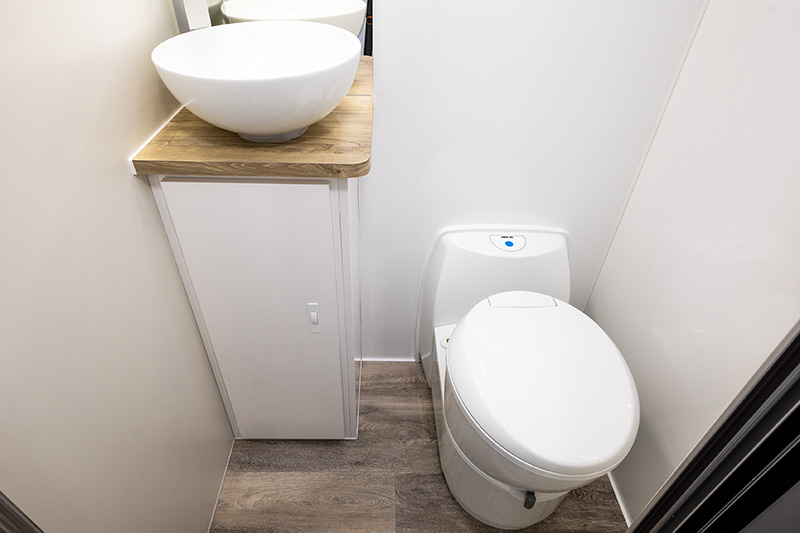 Obviously there are going to be some differences between a 16ft 6in caravan and a 20ft-plus caravan… but all the important bases are covered. There’s even a split bathroom! How does a manufacturer fit a split bathroom inside a compact caravan with a rear entry door? That’s part of what this makes caravan unique.
Obviously there are going to be some differences between a 16ft 6in caravan and a 20ft-plus caravan… but all the important bases are covered. There’s even a split bathroom! How does a manufacturer fit a split bathroom inside a compact caravan with a rear entry door? That’s part of what this makes caravan unique.
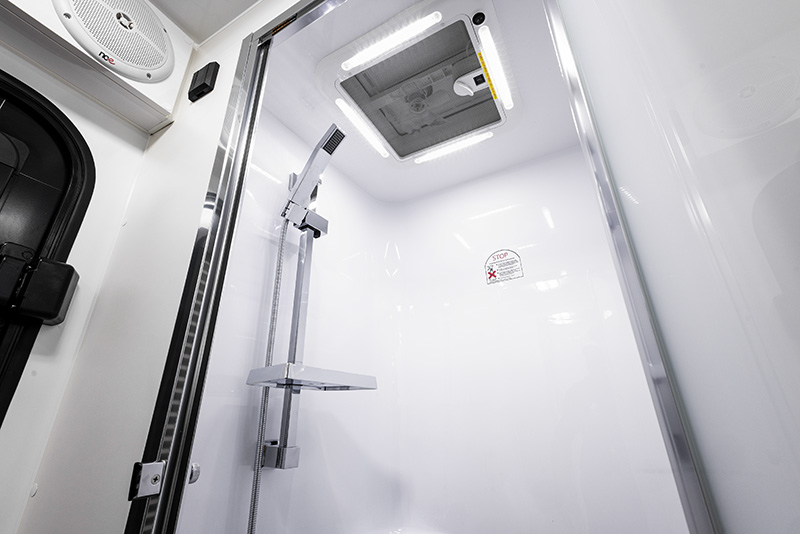 Let’s look at it a little more closely. The layout begins with the bathroom split across the nearside and offside, either side of the entry door. The shower is immediately to the nearside as you climb up the pull-out step (there’s no recessed step – the door sits flush with the floor). It’s a spacious, moulded-fibreglass cubicle complete with stylish stainless steel tapware and a 12V extraction hatch.
Let’s look at it a little more closely. The layout begins with the bathroom split across the nearside and offside, either side of the entry door. The shower is immediately to the nearside as you climb up the pull-out step (there’s no recessed step – the door sits flush with the floor). It’s a spacious, moulded-fibreglass cubicle complete with stylish stainless steel tapware and a 12V extraction hatch.
Immediately opposite, Royal Flair has given the Micron a separate cubicle for a cassette toilet and a vanity, with a small cupboard, a washbasin and a mirror. It’s not a huge space, but nor is it tiny. I think Royal Flair has found the right balance between size and functionality when it comes to the split bathroom setup.
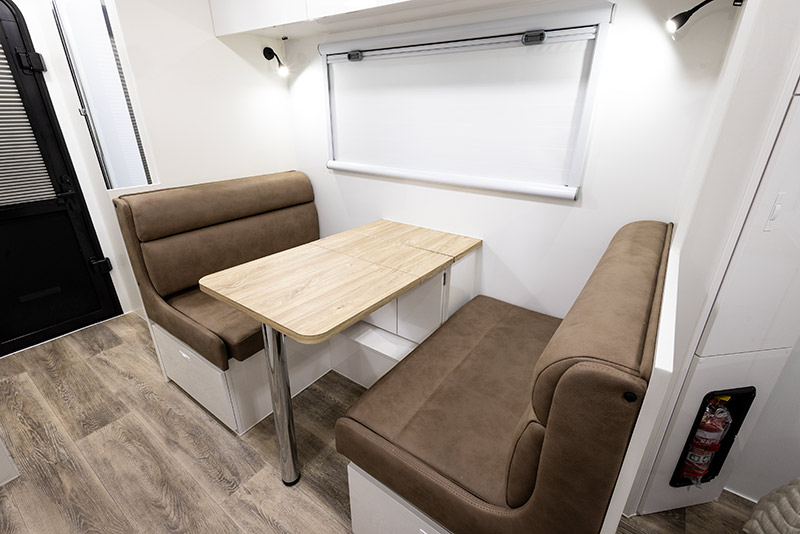 There’s a two-person dinette on the nearside wth a fold-out table and a reading light each – both reading lights have integrated USB points, allowing you to charge your devices while you relax. If I were to add anything here, it would be a powerpoint and perhaps a 12V point in the leg area of the dinette, but it’s absolutely not a deal-breaker!
There’s a two-person dinette on the nearside wth a fold-out table and a reading light each – both reading lights have integrated USB points, allowing you to charge your devices while you relax. If I were to add anything here, it would be a powerpoint and perhaps a 12V point in the leg area of the dinette, but it’s absolutely not a deal-breaker!
Our prototype Royal Flair Micron didn’t have a permanent cooktop, griller or oven installed, though there’s the ability to have one fitted if that’s what you prefer. Our particular van was intended for use with a portable induction cooktop, though the van does come with a single 4.5kg gas cylinder, allowing you to run gas/electric hot water service when you’re off mains power.
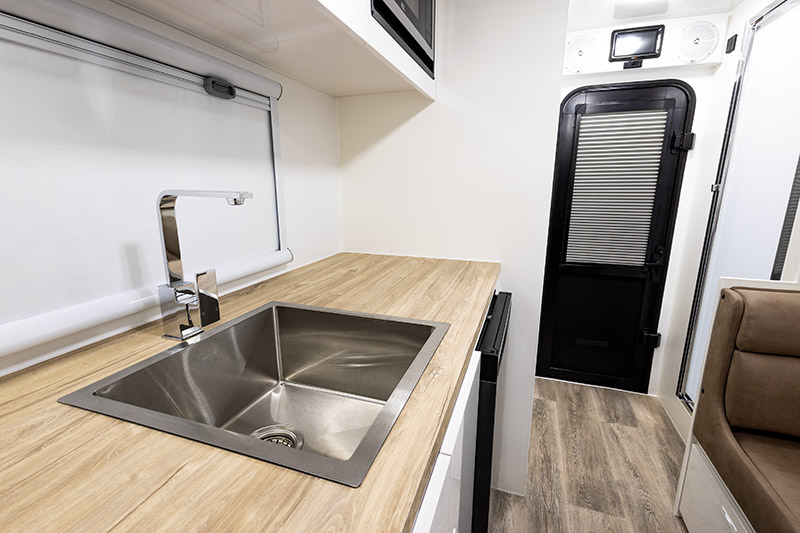 A major benefit to this setup: the kitchen bench space that the van receives as a result, and let’s be honest: in a compact caravan such as this, that bench space is bound to prove useful. The layout has, however, necessitated the use of an under-bench fridge rather than a full upright unit. In this case, it’s a 115L Dometic compressor unit. But to aid with the cooking and reheating side of things, there’s a 900W NCE flatbed microwave
A major benefit to this setup: the kitchen bench space that the van receives as a result, and let’s be honest: in a compact caravan such as this, that bench space is bound to prove useful. The layout has, however, necessitated the use of an under-bench fridge rather than a full upright unit. In this case, it’s a 115L Dometic compressor unit. But to aid with the cooking and reheating side of things, there’s a 900W NCE flatbed microwave
Moving towards the front of the caravan, the Micron comes with a queen-size north-south bed with plenty of space to the sides at the food of the bed, not to mention full-height corner cupboards. Either side of the bed has a wardrobe with niche complete with powerpoints. There’s overhead lockers and, of course, storage space beneath the bed.
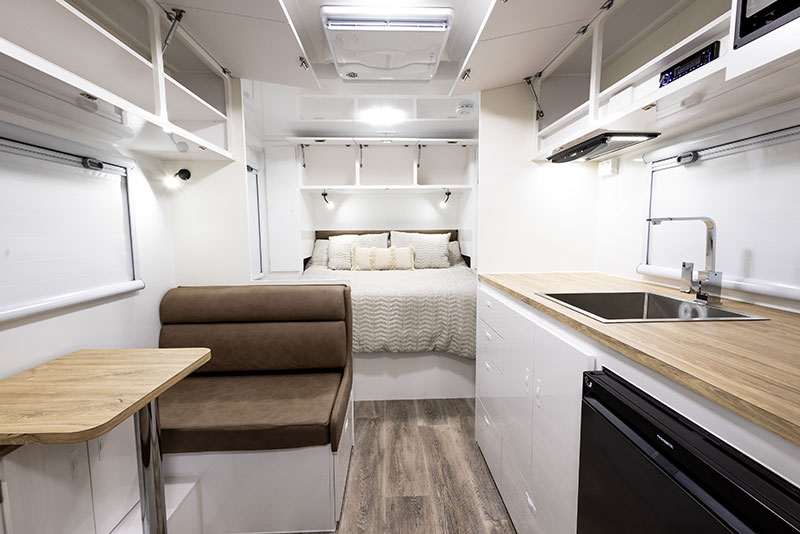 I haven’t mentioned everything but suffice it to say, this caravan offers a lot inside its relatively small dimensions. The quality of the joinery and the fitout is what you’d expect from Royal Flair – no issues on that front. It’s a classy looking interior, with enough space for touring couples in terms of interior living and storage – I’d certainly be happy inside this space.
I haven’t mentioned everything but suffice it to say, this caravan offers a lot inside its relatively small dimensions. The quality of the joinery and the fitout is what you’d expect from Royal Flair – no issues on that front. It’s a classy looking interior, with enough space for touring couples in terms of interior living and storage – I’d certainly be happy inside this space.
GORV’S VERDICT
There’s a lot of benefit to opting for a van such as the Royal Flair Micron. Obviously, the rear-door layout won’t be for everyone – it is a particular niche in the market – but I see a lot of upside to the van’s light weight and reduced length. I also don’t see a lot of compromise in order to achieve the liveability factor that this van offers.
The fitout looks great, and the idea behind the van – to offer a lightweight model that can be towed by a wide range of vehicles, without skimping on the comforts – makes a lot of sense.
THE SCORE
FIT AND FINISH – 
LAYOUT – 
INNOVATION – 
HITS & MISSES
- Protection for plumbing underneath the van
- Overall layout – it feels surprisingly spacious, despite the inclusion of a split bathroom
- Fibreglass sandwich panel construction
- I would add a couple more features at factory, such as an external shower and perhaps an additional 100Ah battery and solar. That said, this is a touring van designed primarily for holiday park stays rather than extended off-grid living
COMPLETE SPECS
Overall length: 7m
External body length: 5.03m
External width: 2.32m (excluding awning)
Travel height: 3.1m
Internal height: 2m
Tare: 1815kg
GTM: 2500kg
ATM: 2722kg*
Unladen ball weight: 222kg
* These were the weights and ratings of the prototype van. The ATM of the Micron is now capped at 2500kg since production vans utilise Al-Ko leaf-springs
Construction/cladding: Fibreglass sandwich panel with honeycomb floor
Coupling: 50mm ball
Chassis: 4in painted SupaGal with 2in chassis raiser.
Suspension: Independent torsion bar (production vans now fitted with leaf-springs)
Brakes: 12in electric
Wheels: 16in alloy
Fresh water: 1x95L
Grey water: No
Shower: No
Awning: Manual wind-out
Battery: 100Ah lithium with BMPRO BatteryPlus 35 battery management system, Odyssey Link and digital display
Solar: 200W
Air-conditioner: Reverse-cycle
Gas: 1×4.5g
Bike rack: No
Sway control: No
Cooking: Portable induction (conventional cooktop/griller/oven available)
Refrigeration: 115L Dometic compressor
Microwave: 23L NCE flatbed
Shower: Hand-held
Heating: Optional
Toilet: Cassette
Washing machine: No
Lighting: LED
Entertainment: 24in smart flatscreen TV; sound system with internal and external speakers
RRP: $75,990


